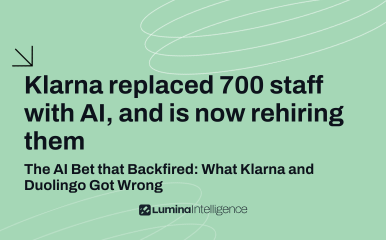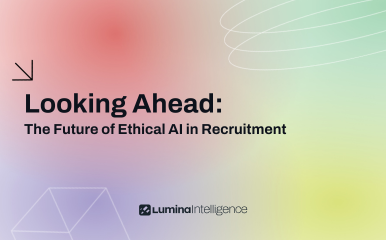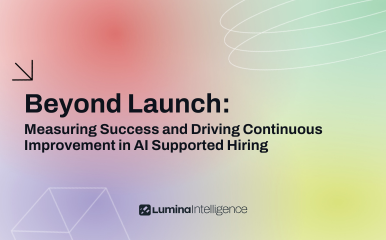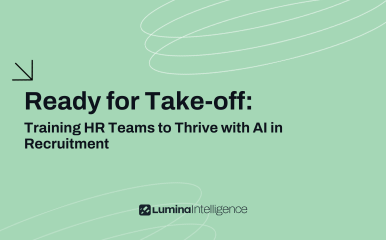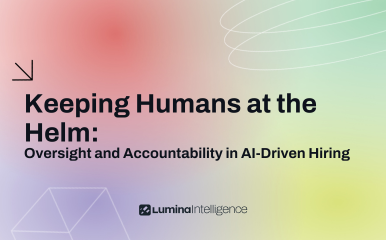How Lumina Intelligence is Transforming Recruitment AI
In today’s competitive hiring environment, AI has become an indispensable tool. But not all AI-powered recruitment solutions are created equal. Many tools promise efficiency, but their approaches often fail to tackle the deeper challenges of hiring—like ensuring fairness, relevance, and actionable insights.
At Lumina Intelligence (Powered by Lumina Innovations) , we’ve built Lumina Intelligence to address these challenges head-on. It’s not just another AI tool; it’s a reimagined system that combines cutting-edge technology with compliance and fairness to deliver transformative results.
Here’s how Lumina Intelligence is changing the game.
The Flaws of Traditional Recruitment AI
Most recruitment systems rely on keyword matching, where CVs are scanned for specific terms or synonyms, and candidates are ranked based on the number of keyword matches.
While this approach may seem efficient, it comes with significant flaws:
- Easily Manipulated: Candidates can overload their CVs with relevant keywords, making them appear more qualified than they actually are.
- Lack of Context: Keyword-matching systems don’t analyze the true relevance, depth, or applicability of a candidate’s skills and experience, leading to superficial results.
Some newer tools have attempted to address these shortcomings by integrating general-purpose AI, such as ChatGPT, to evaluate CVs and job descriptions. While these advancements may seem promising, they introduce critical limitations:
- Inconsistent Results: General-purpose AI struggles to reliably interpret the complex nuances of recruitment, leading to variable and often unpredictable outcomes.
- Surface-Level Understanding: These models tend to focus on broad patterns, missing the detailed connections between a candidate’s background and the specific job requirements.
- Hallucinations: A significant issue with general AI is its tendency to “fill in the blanks” when data is incomplete. For instance, it might infer skills or qualifications that aren’t actually present in a CV, producing misleading results that could compromise hiring decisions.
Additionally, these tools are still bound by the limitations of keyword matching, failing to move beyond superficial analysis. They may combine new technologies but still lack the depth required to truly transform recruitment processes.
How Lumina Intelligence Goes Beyond Keyword Matching
At Lumina Intelligence, we’ve built a system that does more than scan for keywords. Our approach incorporates advanced AI models designed specifically for recruitment, delivering contextual analysis that goes deeper than surface-level matches.
Here’s what sets us apart:
- Relevance Over Keywords: By analyzing the full scope of a CV and job description, our system evaluates how well a candidate’s skills, experience, and potential align with the role—rather than just counting words.
- Nuanced Understanding: Lumina Intelligence captures the intricate relationships between a candidate’s qualifications and the job requirements, ensuring meaningful connections are identified.
- Accuracy Without Hallucinations: Unlike general-purpose AI, our system provides insights based only on the actual data, avoiding the pitfalls of “filling in the blanks” with assumptions.
These advanced capabilities ensure that Lumina Intelligence delivers precise, fair, and actionable results—helping recruiters make smarter hiring decisions without the guesswork.
By moving beyond traditional keyword matching and addressing the limitations of general AI, we’re setting a new standard for recruitment technology.
How Lumina Intelligence is Different
At Lumina Innovations, we’ve taken a more advanced approach. Lumina Intelligence uses specialized AI models and advanced technology to analyze CVs and job descriptions in a way that is thorough, fair, and precise.
Here’s how it works:
- Advanced Prompt Engineering: Ensures our system extracts the most meaningful insights from CVs and job descriptions, prioritizing relevance, potential, and context.
- Specialized AI Models: Different models are used for specific recruitment tasks, such as evaluating transferable skills, identifying cultural fit, and flagging inconsistencies.
- Legislation Compliance: Lumina Intelligence is explicitly programmed to align with hiring laws like The Equality Act 2010, ensuring fair and lawful evaluations.
This multi-layered approach enables Lumina Intelligence to provide a deeper, more meaningful analysis of candidates, going beyond surface-level keyword matching or generalized AI outputs.
Addressing Bias in Recruitment AI
One of the biggest challenges in recruitment AI is bias. Systems trained on skewed or incomplete data can unintentionally favor certain groups, perpetuating inequalities rather than resolving them.
Sources of Bias in Recruitment AI
- Narrow Training Data: If the data lacks diversity, the AI may overlook candidates from underrepresented groups.
- Irrelevant Factors: Some systems prioritize proxies like names, educational institutions, or locations, rather than focusing on skills and potential.
How Lumina Intelligence Reduces Bias:
- Diverse Training Data: We ensure our models are built on inclusive datasets to accurately evaluate candidates from a wide range of backgrounds.
- Custom Data Processing: Input data is refined to eliminate irrelevant factors, so candidates are assessed on merit alone.
- Compliance Standards: By aligning with key legislation, Lumina Intelligence promotes fairness while reducing the risk of discrimination.
Our technology doesn’t just aim for accuracy—it strives for equity, helping companies build diverse and inclusive teams.
Why Self-Learning Models Struggle in Recruitment
Self-learning AI models are often marketed as cutting-edge, but in recruitment, they face serious limitations:
- Small Applicant Pools: Each role generates a limited number of applications, which isn’t enough for robust self-learning.
- Bias in Data: Applicant pools often reflect existing industry biases, which these models can amplify.
- Changing Requirements: Every role and hiring manager has unique needs, making it difficult for self-learning AI to adapt effectively.
Lumina Intelligence avoids these pitfalls by using supervised AI, where human oversight ensures consistent and reliable results tailored to the specifics of each role.
Real Results from Lumina Intelligence: Insights from Industry Experts
Over the past few months, HR and recruitment experts across various industries have been rigorously testing Lumina Intelligence ahead of its January 2025 launch. Their feedback has been nothing short of transformative:
- Uncovering Hidden Talent: Candidates who might have been overlooked by traditional methods often rise to the top with Lumina Intelligence, showcasing the system’s ability to go beyond surface-level assessments.
- Broader Diversity: By prioritizing skills, potential, and context over superficial criteria, Lumina Intelligence has helped testers build more inclusive and representative talent pools.
- Streamlined Decision-Making: With precise insights, actionable recommendations, and clear scoring, recruitment experts have been able to make faster, smarter hiring decisions—saving time without compromising on quality.
This real-world testing has proven that Lumina Intelligence isn’t just an AI tool—it’s a game-changer for recruitment.
Experience the Future of Recruitment
Recruitment is about more than filling positions—it’s about finding the right people, ensuring fairness, and making informed decisions. At Lumina Innovations, we’re proud to lead the way with a system that combines advanced AI, fairness, and compliance to transform hiring for the better.
